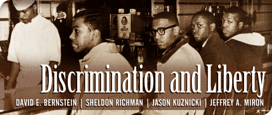Lead Essay
In this month’s lead essay George Mason University professor of law David E. Bernstein argues that libertarian opposition to antidiscrimination law generally makes sense because the current notion of legally impermissible discrimination is so expansive. He writes: “To concede the general power of government to redress private discrimination through legislation would be to concede virtually unlimited power to the government.” However, Bernstein argues that libertarians can accept antidiscrimination law as long as it conforms to an appropriate limiting principle and goes on to argue that Title II of the Civil Rights Act fits the bill. “Many libertarians today, including me, think our predecessors were wrong in their blanket opposition to such laws, in part because they neglected some of the legal and historical context.”
Response Essays
In his reply essay, The Freeman’s Sheldon Richman drives home David Bernstein’s point “that the Southern states operated the equivalent of a ‘white supremacist cartel’ in public accommodations,” but suggests that “direct nonviolent social action” would have been superior to a legal remedy. “Social pressure — the public shaming of bigots — was working,” Richman argues. Title II was not only unnecessary, Richman says, but it shifted the focus from local nonviolent action to Washington, D.C., and laid the groundwork for further clearly unjustified legal limits on private discrimination.
In his reply to this month’s lead essay, Cato Unbound’s own Jason Kuznicki argues that “what we got from the 1964 CRA was on balance much, much less coercion. We also got a less racist society…I can’t say exactly why the 1964 CRA worked, but I suspect that Title II, as its most innovative feature, played a big part.” Not only did Title II work, Kuznicki finds it perfectly consistent with his own Hayekian ideological standards. Kuznicki then asks if Title II is Constitutional and expresses some doubts, but implores originalists to focus their energies elsewhere. “[A]dvocates of limited government have scant political capital, so let’s not squander it,” he concludes.
Harvard economist Jeffrey Miron vigorously dissents from the conclusion of David Bernstein’s lead essay. “[L]ibertarians should not only oppose Title II,” he writes, “they should shout that opposition from the highest roof tops.” Miron argues that the elements of the Civil Rights Act that targeted government discrimination would have sufficed: “[A]CRA that merely targeted government discrimination would likely have changed the social norm, allowed non-discriminatory forces to emerge, and toppled the Jim Crow regime.” The primary consequences of Title II, Miron argues, were to weaken property rights and set the stage for further interventions such as smoking bans and safety regulations, while “institutionalizing the view that blacks are too weak to overcome discrimination on their own.” Miron finds the libertarian case against Title II so strong that he is surprised to see libertarians defend it. “[I]f libertarians are supporting Title II out of political expediency, they are on a fool’s errand.”

